By Phoenicia Lewis, MA SID/COEX'16, and Topol Fellow Wafaa Arbash, MA SID/COEX'16
Phoenicia, 2015, Boston, USA
When our master’s program asked me to interview Wafaa, I assumed it would be easy to tell her story. As her friend and classmate I was eager to hear a more thorough version of her life than she shares in classes. Talking about Syria, Wafaa’s home country, has become natural in the Heller School’s Coexistence and Conflict program. As we’ve moved through the courses, Wafaa and I have had many difficult conversations about conflict, mostly at the macro level. Outside of class, we often decompress from the stress that these conversations cause. For those of us who have experienced it first hand, even academic discussions about conflict are difficult.
Although Syria is possibly the most complex and commonly discussed conflict occurring presently, for Wafaa it is much more than academic discourse. Unlike most of us, when Wafaa watches the destruction of her country in the media, she does not see words on pages or images on the news, she sees childhood memories. She dreams about her family. It is the only place she’s been able to touch them since she left home two and a half years ago, never imagining the war zone it would become.
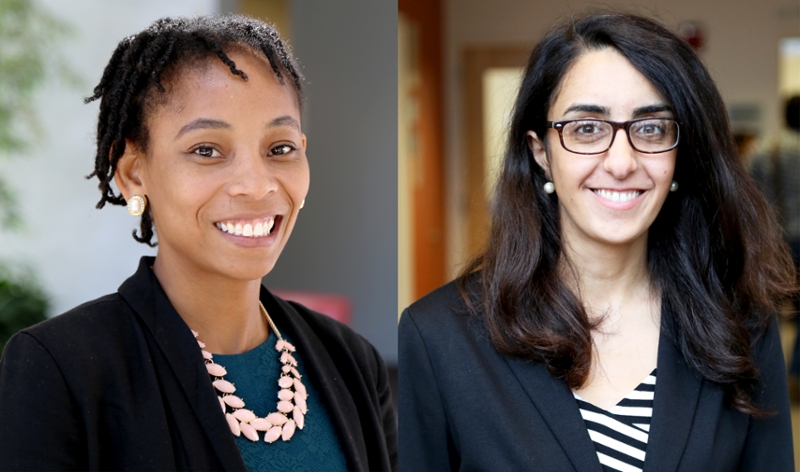
Phoenicia Lewis, SIDCO'16 (left) and Wafaa Arbash, SIDCO'16 (right), at the Heller School in 2015
As a U.S. Army veteran, I approach conflict with a sense of urgency. The first time I sat down to interview Wafaa, I couldn’t help but remember my 2009 deployment to Taji, Iraq. I saw faces, many of them Iraqi, and I remembered sounds. I remembered certain smells, which triggered memories, many of which were largely forgotten or suppressed. As I listened to Wafaa I wondered about which faces, sounds and memories arise when she watches the news, or talks about Syria daily in class.
She and I both have experience in war, but our paths could not be more different. We both get anxious at the sound of fireworks, but if I can anticipate them they are actually soothing to me. They always elicit fear for her. We have both had many sleepless nights. I’ve stayed awake worrying that I contributed to others’ pain, while Wafaa tosses and turns thinking about her family. I am from a family with roots in military service, so joining felt natural. While I ran to war, Wafaa ran from it.
What follows are a few pieces of our individual experiences with war. Mine is the story of a young, black female officer just out of college, serving as a platoon leader in Iraq. Wafaa’s is the story of a young Syrian woman who left her home and family to pursue her studies in the U.S. at the onset of the crisis in Syria.
Wafaa, September 2013, Utah, USA
I left Syria on June 4, 2013 at 7:00am. It was my first time traveling abroad. I was only supposed to stay in the U.S. for two months before returning to Syria. I checked the news every minute, even at night. I would wake up in the middle of the night to call my family and make sure they were still alive. When I watched the news I would look closely at the pictures to see if my house was one of the buildings that was bombed or destroyed.
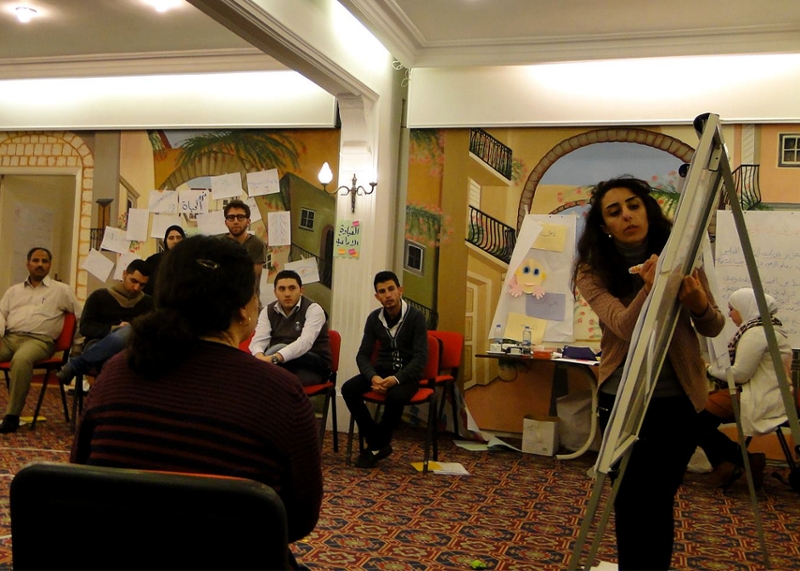
Wafaa Arbash (at right) in Lebanon, 2013. Prior to moving to the U.S., Wafaa worked as a trainer for social development programs where she travelled extensively between cities in Syria.
Leaving my home, family, and friends was the hardest thing I’ve ever done in my life. I left everything I knew—my happiness, love and safety. My heart was at home in Syria. It was so hard to focus on my schoolwork at Utah State University. Part of me felt helpless, guilty, and worried, while the other part was of me was fulfilling my dream to study abroad. After three months in the U.S. the situation in my hometown became increasingly dangerous. Bombs exploded day and night in the town where my family and friends live.
Phoenicia, November 2008, Camp Shelby Mississippi, USA
Six months after graduating from Temple University, I left for Officer Basic course. As a brand new U.S. Army officer with my country at war in two war zones, I knew deployment was inevitable. I was anxious about the possibility of not returning home, but I made comments to fellow soldiers, like, “training and not deploying is like practicing for the big game and never playing.” I felt that war was part of my job, that it was what I had committed to do. I wanted to prove to myself that I could successfully accomplish the thing with the least possibility for success: going to war seemed impossible.
Wafaa, 2013, Syria
I had never heard a bomb before until that morning. I was sleeping when a very strong noise shook my house and woke me up. At first I thought maybe I was still sleeping, that it was just a dream. I got out of bed and could hear an incredible amount of noise in my street. People were yelling, others were wondering what was going on. I realized something bad was happening, and then I remembered that my mom and sister weren’t home. I tried to call them but there was no response. I didn’t know what to do. I went out into the street to talk to my neighbors, but nobody was sure what the noise was. Some guessed that a jar of gas exploded, others suggested it might be a bomb. Finally, my mom and sister came home and I felt only relief.
I used to watch conflicts happening around the world on television, and I always told myself that it was very far from Syria. We lived in a safe and stable country. Now I know that this can happen anywhere, at any time. That bomb changed the way I wake up every day. Instead of waking up to Fairoz songs and my mom’s voice calling me to coffee, my alarm became the sound of bombs inside my head. Every night when I go to sleep I don’t know what might happen during the night. It’s frightening to feel your life and the lives of the people around you could end any minute. Now I tell myself I’m far away from Syria and there is no bombing here, just to make it through my day.
Phoenicia, 2006, Fort Knox, Kentucky, USA
As an ROTC Cadet I learned how to “call for fire.” It involved a grid with numbers, and mathematical calculations. My instructor told us we needed to “walk a round onto a target.” I sat in the classroom (in uniform) trying to figure out what I was being asked to learn, but I struggled to grasp the concept. A few months later at a training exercise in Fort Knox, Kentucky, those instructions came alive.
As a five foot, two inch, 120-pound woman, I always felt I had to prove I deserved to be there. I had to prove I deserved to wear the uniform, to be called “ma’am,” to lead soldiers, to contribute. When I was challenged to pick up a 95-pound M107 round and carry it over to the Howitzer crew, I carried it because I love challenges. I watched the crew load the weapon with amazing efficiency. Within seconds they signaled to the crew chief and then all turned away from the machinery as the round was fired. Even with bright orange earplugs protecting my hearing, the sound tickled my eardrums and the power of the machinery shook the foundation I stood on.
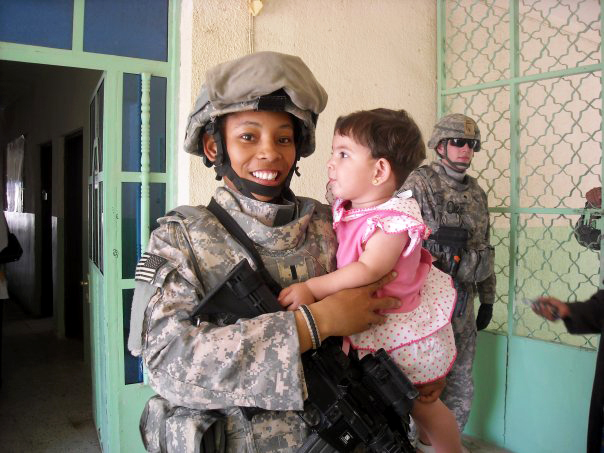
Phoenicia Lewis in Hossenia, Iraq, 2009
The explosion did not leave my mind that night as I slept. In the most vivid dream I’ve ever had, I saw a round tearing through the sky and heading toward me. I decided that night that I did not want to work in artillery. That training round impacted the way I view the complexity of war. My dream may have been just a dream, but it is was where I first imagined and felt the consequences of what I was being prepared to do. I felt the pain and uncertainty of those living in a war zone. These feelings stayed with me when I deployed to Iraq in 2009 as a military intelligence officer.
Wafaa, November 2015, Boston, Massachusetts, USA
I can’t wait to see my family again. Seeing how much my nieces and nephews have grown makes me miss them like crazy. I want so badly to watch them grow up. But I can’t go home right now because of my visa.
Nobody chooses to be a refugee.
Destroyed cities, death of thousands and millions of displaced people are some of the results of the Syrian conflict. Refugees lose their homes, jobs, hope and all of their possessions in exchange for their lives. Syria has over 10 million displaced people —half of the Syrian population. There are around 4.2 million refugees in the neighboring countries of Lebanon, Turkey, Jordan, Egypt and more recently, Europe. There are also around 7.6 million internally displaced people still in Syria. Internally displaced people live with much of their extended family in the same house and sometimes in the same room. They struggle to meet their basic needs due to the skyrocketing costs of food and standard goods. Fifty percent of Syrian refugee children are out of school, and have been traumatized by war. Around 4,000 schools are closed due to damage or because in-country refugees are living in the school buildings.
Phoenicia, 2009, Hosseinia, Iraq
I remember camels walking through endless sands in the deserts of Kuwait. I remember the first sunset I saw in Baghdad; it reflected off a small, man-made lake behind the tarmac where I stood waiting for it to be dark enough for the Chinook helicopter to arrive and take us into Taji.
As a military intelligence officer, my combat zone was mostly behind a desk. But there are parts of 2009 I remember in feelings. My first mission outside the base felt like permission to leave my desk. I was eager to go and experience the feelings the infantry guys felt every day. I listened intently to the situation brief, which seemed mundane to the Stryker crew I was riding with. When we loaded into their Stryker and the door closed, the lack of windows made me uneasy.
When our movement stopped I listened as they passed word along to one another. “Ready LT?” the squad leader asked me as the door opened, exposing us to the outside world. I rubbed my finger along the trigger well and began to graze my thumb against the safety. As the ramp hit the ground my eyes scanned the view outside. I saw a man sitting on a tan plastic chair under a tree by the side of the road. Before I could process what he was doing, or how confusing it was to see him sitting in jeans and a t-shirt, doing nothing in the middle of the day, three young girls holding hands walked into view. They pretended not to look at us as they scurried past our over 8 feet olive green vehicle. The oldest of the three, no more than 11, walked between the other two and silently pulled them along.
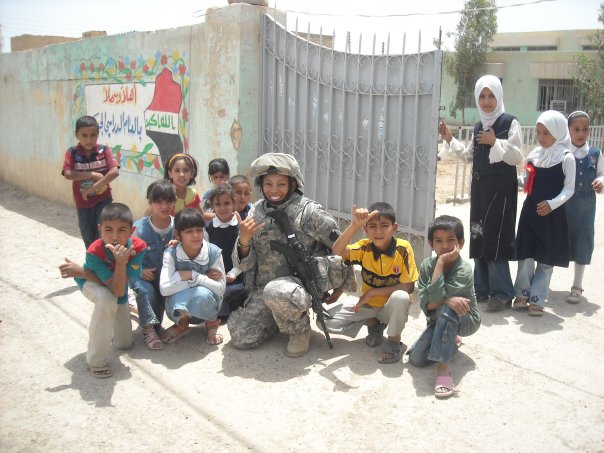
Phoenicia Lewis in Hossenia, Iraq, 2009
Wafaa, November 2015, Boston, Massachusetts, USA
I want everyone to understand that refugees are human beings, and that they have the right to live their lives the way they want. They deserve a better place, away from the daily sounds of bombs. No one is guaranteed a life free from terrible things. It breaks my heart to see that most countries are not welcoming to refugees, and treat them poorly. Let’s imagine that these people are your family. Is this how a person treats family?
European countries are now experiencing the effects of the conflict in Syria as refugees pour across their borders. Many generalizations have arisen about the refugees, and in these generalizations, humanity is lost.
It is my hope that Syrians will rebuild Syria again, with an inclusive community. Let’s engage our hearts and work together to save our humanity, to write a great history and to make tomorrow better for everyone.
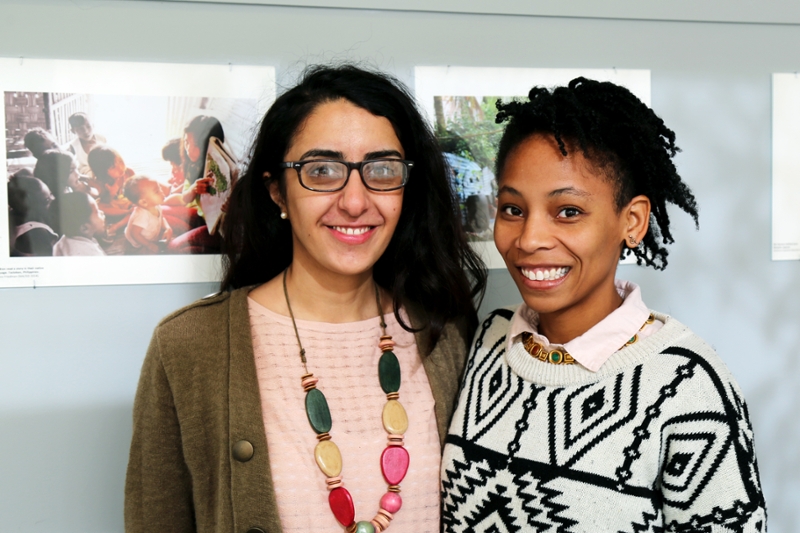
Wafaa Arbash (left) and Phoenicia Lewis (right), at the Heller School in 2015
Phoenicia, 2015, Boston, Massachusetts, USA
I did not want to write Wafaa’s story, as she is the best narrator of her experience. She is a graduate student because she worked hard to be here, and she appreciates and hopes to use her education to use her voice to make lives better. There are many articles written about Syrians as victims or refugees, but to me she is none of the things the articles call Syrians. I can relate. The characterizations of Iraq and Afghanistan war veterans as heroes, perpetrators, or broken victims in no way describe me. Having experienced conflict we both recognize that as we work to address our personal trauma, in our work we will interact with communities who have also experienced trauma. Decision makers should consider how policies affect the populations for whom they are creating policies. Often trauma is not one of the considerations. Policies should support inclusive societies, not spurn further conflicts of identity or conflicts that demand equality.
As development professionals we believe in the preamble of the United Nations which places importance on the promotion of "social progress and better standards of life in larger freedom." Policy makers, particularly those from member states of the UN, should weave this into the essence of their policies. These policies should, as the preamble continues, "practice [inclusion] and [ensure communities] live together in peace with one another as good neighbors."
Wafaa, 2015, Boston, Massachusetts, USA
We wrote our stories not to detail our personal lives. Rather, our hope was that through sharing our experiences we would give people a glimpse of the humanity that exists in conflict zones. We wanted to expose the human cost of war. We believe that by changing ourselves, we can contribute to peace on a larger scale.
Regarding climate change, UN Secretary General Ban Ki Moon says that we don’t have a plan B to correct the harm we’ve caused the Earth. Phoenicia and I also do not have a plan B for our future--successfully contributing to creating sustainable peace is our only option.
